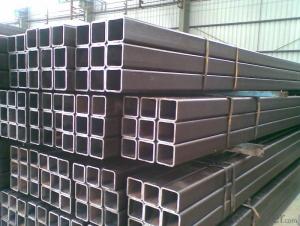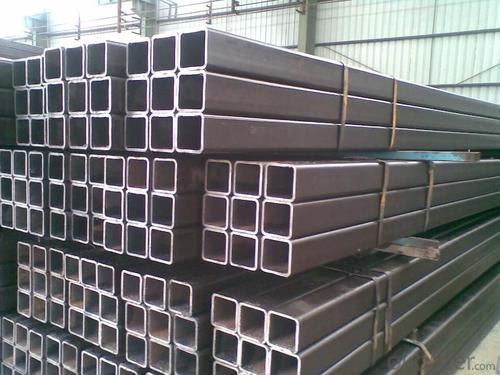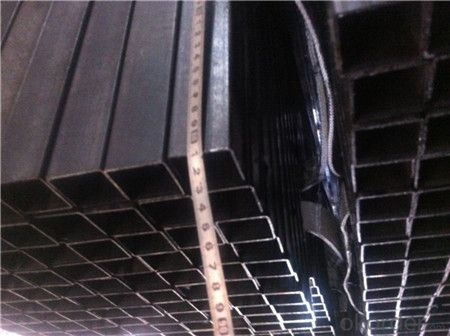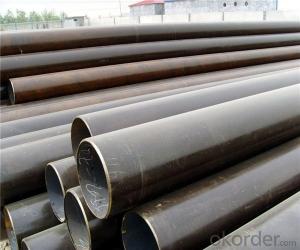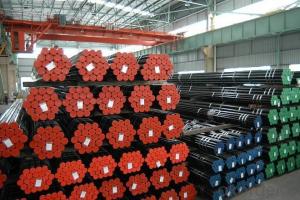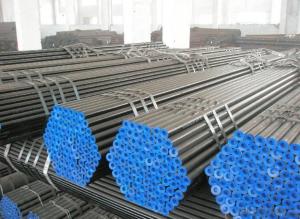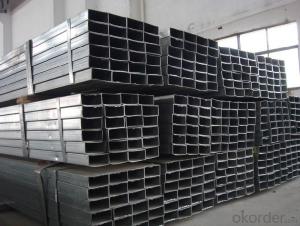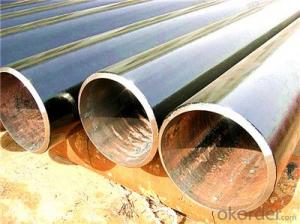Square Steel Pipe with Best Quality JIS, GB, DIN, ASTM
- Loading Port:
- Tianjin
- Payment Terms:
- TT or LC
- Min Order Qty:
- 20 m.t.
- Supply Capability:
- 15000 m.t./month
OKorder Service Pledge
OKorder Financial Service
You Might Also Like
1、Structure of Square Steel Pipe:
Seamless pipe is formed by drawing a solid billet over a piercing rod to create the hollow shell. As the manufacturing process does not include any welding, seamless pipes are perceived to be stronger and more reliable. Historically seamless pipe was regarded as withstanding pressure better than other types, and was often more easily available than welded pipe.
2、Main Features of Square Steel Pipe:
• High manufacturing accuracy
• High strength
• Small inertia resistance
• Strong heat dissipation ability
• Good visual effect
• Reasonable price
3、Square Steel Pipe Specification:
Standard | GB, DIN, ASTM ASTM A106-2006, ASTM A53-2007 |
Grade | 10#-45#, 16Mn 10#, 20#, 45#, 16Mn |
Thickness | 8 - 33 mm |
Section Shape | Round |
Outer Diameter | 133 - 219 mm |
Place of Origin | Shandong, China (Mainland) |
Secondary Or Not | Non-secondary |
Application | Hydraulic Pipe |
Technique | Cold Drawn |
Certification | API |
Surface Treatment | factory state or painted black |
Special Pipe | API Pipe |
Alloy Or Not | Non-alloy |
Length | 5-12M |
Outer Diameter | 21.3-610mm |
Grade | 20#, 45#, Q345, API J55, API K55, API L80, API N80, API P110, A53B |
Standard | ASME, ASTM |
1) Material:20#(ASTM A 106/A53 GRB.API5LGRB,GB),45#,16Mn,10#.
2) Specification range:OD:21.3-610mm,WT:6-70mm,length:6-12m or according to the requirement of clients.
3) Excutive standards:GB,ASME API5L.ASTM A 106/A53,Despite of the above standards,we can also supply seamless steel pipe with standard of DIN,JIS,and so on,and also develop new products according to the requirements of our clients!
4) Surface:black lacquered,varnish coating or galvanized.
5) Ends:Beveled or square cut,plastic capped,painted.
6) Packing:bundles wrapped with strong steel strip,seaworthy packing.
4、FAQ of Square Steel Pipe:
①How is the quality of your products?
Our products are manufactured strictly according to national and internaional standard, and we take a test
on every pipe before delivered out. If you want see our quality certifications and all kinds of testing report, please just ask us for it.
Guaranteed: If products’ quality don’t accord to discription as we give or the promise before you place order, we promise 100% refund.
②How about price?
Yes, we are factory and be able to give you lowest price below market one, and we have a policy that “ for saving time and absolutely honest business attitude, we quote as lowest as possible for any customer, and discount can be given according to quantity”,if you like bargain and factory price is not low enough as you think, just don’t waste your time.Please trust the quotation we would give you, it is professional one.
③Why should you chose us?
Chose happens because of quality, then price, We can give you both.Additionally, we can also offer professional products inquiry, products knowledge train(for agents), smooth goods delivery, exellent customer solution proposals.Our service formula: good quality+good price+good service=customer’s trust
SGS test is available, customer inspection before shipping is welcome, third party inspection is no problem.
5、Square Steel Pipe Images:
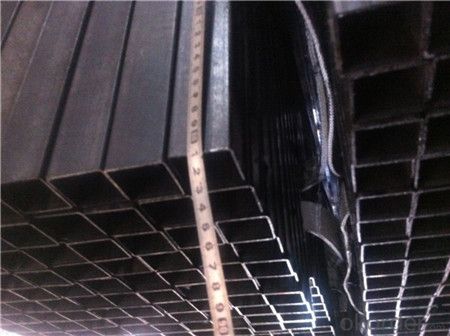
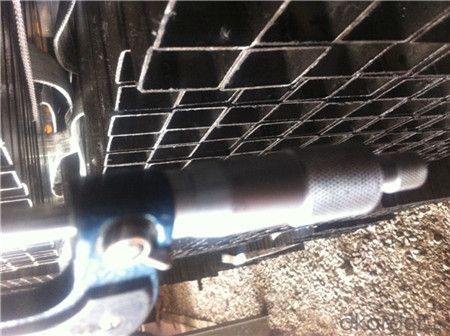
- Q: What are the different methods of pipe cutting for steel pipes?
- There exists a variety of techniques for cutting steel pipes, each tailored to specific circumstances and demands. Some of the most prevalent techniques are as follows: 1. Manual Pipe Cutters: These handheld tools are frequently employed for cutting smaller steel pipes. They typically feature a rotating cutting wheel that gradually creates a groove until the pipe is severed. Portable and relatively user-friendly, manual pipe cutters are suitable for on-site cutting tasks. 2. Hacksaw: The use of a hacksaw is a traditional and cost-effective means of cutting steel pipes. This method requires physical exertion and time; however, it can effectively cut pipes with smaller diameters. It is crucial to use a fine-toothed blade and apply steady pressure to ensure a clean and precise cut. 3. Reciprocating Saw: Also known as a sawzall, the reciprocating saw is a power tool that employs a back-and-forth cutting motion to swiftly and efficiently cut through steel pipes. These versatile saws can accommodate different types of blades to handle various pipe sizes and thicknesses. 4. Band Saw: Band saws are commonly employed in industrial settings for the purpose of cutting large steel pipes. These saws feature a continuous loop of teethed metal blade that moves on wheels, enabling precise and rapid cutting. Band saws are ideal for cutting large-diameter pipes and can be operated manually or fully automated for high-volume cutting tasks. 5. Pipe Cutting Machines: Pipe cutting machines are often utilized to achieve precise and consistent cuts. These machines are designed to cut steel pipes swiftly and accurately, making them suitable for large-scale industrial applications. Depending on the machine and requirements, various cutting methods like abrasive cutting, flame cutting, or plasma cutting can be employed. It is important to note that the selection of a pipe cutting method depends on factors such as pipe diameter, thickness, location, precision requirements, and available resources. It is imperative to adhere to proper safety precautions when working with any cutting method to prevent injury or damage to the pipes.
- Q: What is the outer diameter and wall thickness of the welded steel pipe of national standard DN250?
- DN250 is the nominal diameter, the outer diameter of the steel pipe is 273mm, the thickness is above 6.5mm.
- Q: What are the advantages of using steel pipes over other materials?
- There are several advantages of using steel pipes over other materials: 1. Strength and Durability: Steel pipes are known for their exceptional strength and durability. They can withstand high pressure, heavy loads, and extreme weather conditions, making them suitable for various applications, including transportation of fluids and gases, structural support, and underground pipelines. 2. Corrosion Resistance: Steel pipes can be coated with different materials to enhance their resistance to corrosion. This makes them suitable for transporting water, chemicals, and other corrosive substances without the risk of pipe degradation. Additionally, steel pipes are less susceptible to rust, which prolongs their lifespan. 3. Cost-effectiveness: Although steel pipes may have a higher upfront cost compared to other materials, they offer long-term cost-effectiveness. Due to their durability and resistance to corrosion, steel pipes require less maintenance and replacement, resulting in reduced operational costs over time. 4. Versatility: Steel pipes come in various sizes, shapes, and thicknesses, making them versatile for different applications. They can be easily customized and fabricated to meet specific requirements, such as bending, welding, and threading. 5. Fire Resistance: Steel pipes have a high melting point, making them resistant to fire and reducing the risk of structural damage during a fire incident. This characteristic is particularly important in industries where fire safety is crucial, such as oil and gas, chemical, and construction. 6. Eco-friendly: Steel is a recyclable material, and steel pipes can be recycled and reused multiple times without compromising their quality. This not only reduces the demand for new materials but also contributes to environmental sustainability. 7. Excellent Flow Characteristics: Steel pipes provide smooth internal surfaces, minimizing friction and allowing for efficient flow of fluids and gases. This advantage is particularly significant in industries where fluid dynamics and energy efficiency are essential, such as oil and gas, water supply, and HVAC systems. In conclusion, steel pipes offer numerous advantages over other materials, including strength, durability, corrosion resistance, cost-effectiveness, versatility, fire resistance, eco-friendliness, and excellent flow characteristics. These advantages make steel pipes the preferred choice for a wide range of applications in various industries.
- Q: What are the specific differences between flexible pipes and rigid pipes?
- The rigid waterproof sleeve is used in the wall of the building which does not need to bear the vibration and expansion deformation of the pipe, and the wall thickness is 200mm in general;Flexible waterproof sleeve is mainly applicable to the wall of buildings with seismic requirements, pipeline vibration and expansion deformation, and strict waterproof requirements, and the wall thickness is 300mm
- Q: What are the safety precautions while working with steel pipes?
- When working with steel pipes, it is important to follow several safety precautions. Firstly, always wear protective gear such as gloves, safety glasses, and steel-toed boots to prevent injuries. Secondly, ensure that the work area is properly ventilated to avoid inhaling harmful fumes or gases. Additionally, use caution when handling heavy pipes to prevent strains or sprains. Lastly, be mindful of potential hazards such as sharp edges, hot surfaces, or falling objects, and take appropriate measures to minimize risks.
- Q: Difference between cold rolled steel pipe and common steel pipe
- 3, the caliber of cold-rolled steel tube is smaller than that of hot rolled steel tube4, from the price point of view, cold-rolled steel pipe is 1000-2000 tons more expensive than hot-rolled steel pipe
- Q: What are the different methods of cleaning steel pipes?
- There are several methods for cleaning steel pipes, including mechanical cleaning, chemical cleaning, and high-pressure water jetting.
- Q: What is the maximum bending radius for steel pipes?
- The maximum bending radius for steel pipes depends on various factors, such as the pipe diameter, wall thickness, and the type of steel used. Generally, larger diameter pipes with thicker walls have a larger maximum bending radius. However, it is important to follow industry standards and guidelines to ensure the structural integrity of the pipe is maintained during the bending process. Consulting the manufacturer's specifications or referring to relevant codes and standards, such as the American Society of Mechanical Engineers (ASME) B31.1 or B31.3, can provide specific information on the maximum bending radius for steel pipes in different applications.
- Q: How are steel pipes used in the construction of oil storage tanks?
- Steel pipes are commonly used in the construction of oil storage tanks as they provide strength, durability, and corrosion resistance. These pipes are used to connect various components of the tank, such as the walls, roof, and bottom, ensuring a secure and leak-proof structure. Additionally, steel pipes are also used to transport oil within the tank and for the installation of necessary fittings, valves, and other equipment.
- Q: How are steel pipes tested for pressure and leakage?
- Steel pipes are tested for pressure and leakage through various methods including hydrostatic testing, pneumatic testing, and ultrasonic testing. Hydrostatic testing involves filling the pipe with water and applying pressure to check for any leaks or weaknesses. Pneumatic testing involves using compressed air instead of water. Ultrasonic testing uses high-frequency sound waves to detect any flaws or defects in the pipe material. These testing methods ensure that steel pipes meet the required standards for pressure and leakage resistance.
Send your message to us
Square Steel Pipe with Best Quality JIS, GB, DIN, ASTM
- Loading Port:
- Tianjin
- Payment Terms:
- TT or LC
- Min Order Qty:
- 20 m.t.
- Supply Capability:
- 15000 m.t./month
OKorder Service Pledge
OKorder Financial Service
Similar products
Hot products
Hot Searches
Related keywords
